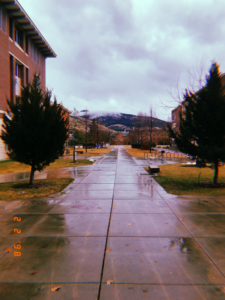You Get What You Expect by Jamie Miller
I loved college. Growing up: my mother didn’t send me to bed with fairy tales. Instead she sang me to sleep with the enchanting, alluring stories of “the college days”. I understand many hear the phrase “college days” and a hundred different visuals of partying gone astray enters their mind. But that isn’t how my mother sold college to me. As an immigrant from Vietnam, college was my mom’s chance to cement her belonging in the United States, and have a better chance at a career than when she and her mother first arrived in America. She filled my head with poems of meeting friends for a lifetime, having access to elite libraries and spending day after day in polished, glorious rooms of academia, accessing brilliance. So since the age of five I had been waiting for my turn to carry books across an ivy leaf covered campus in the fall with a bell tower caroling in the background. And my mother was right: I did meet life-changing friends, got an adrenaline rush in every classroom, and my brain was challenged in ways I’ve waited for my whole life; socially and academically.
What I didn’t expect, was getting to graduate from college, and going from one beautiful campus to the next. Now I am an academic coach at the University of Montana through AmeriCorps, serving a Gap scholarship on campus. Every day I walk onto campus not as a student, but a service member: I chuckle at the blessing to extend my mom’s dreams a little bit longer.
The second thing I didn’t expect was a world-wide pandemic, national lockdowns, and a type of campus no one saw coming: a six- feet apart, mask wearing, online learning world.
And the freshmen I advise didn’t expect it either.
When I signed on to serve with AmeriCorps as an academic coach I wasn’t sure what Covid-19 would look like when my term began. My heart sank when my student meetings quickly turned into two-dimensional relationships over zoom. Solely because I wanted my students to trust me, know I was on their side and allow their academic dreams to become my own. This bond is more challenging to form when they can’t read my body language, and I am another authority figure assigned to their life. Each meeting with them they were polite, respectful and honest about how school was overwhelming and hard. I’d nod my head in empathy but encourage them to go past what they thought I wanted to hear and asked each of them, what did you want when you came to college? What were your expectations of the legendary “college days” and what was the reality instead?
My current role is assisting freshmen to succeed. My students know my role is to assist freshmen success. But I’ve found the healthiest way to foster success: is to change its definition. My mom sewed tales of epic adventure, novel friendships and inspiring intelligence. But college can’t even live up to the standards of college.
So to start redefining success I’d ask all of my students “What were your expectations, and what was the reality?” My hope with the question was to allow them to realize college is never as amazing as the mythology hints. I communicated my belief that the best way to grasp their academic dreams was to accept that college comes with unforeseen challenges for all, and success isn’t as black and white as a 4.0 GPA. One of the greatest jobs I ever had, our boss explained he hired people based on the question “how do you respond to failure”? Because the ability to adjust one’s vision and strategy when life presents different hurdles is much more of an adversary skill than “I blinked and was just great at everything.”
My students are all capable, come from adversity, and yet still dare to dream. I hope the small role I play in their lives serves to encourage them that their hurdles are note-worthy and growth from any starting point is success. My students are the best part of the job. They are Batman and I am Robin. They came to college expecting friends on the first day, glorious in-person rooms of academia and for campus to immediately feel like home. Instead, they are accepting a new world: where they kick aside awkwardness and ask classmates to hang out via zoom chat boxes, find creative ways to make attending social distanced events enjoyable and learn how to stay motivated during remote learning classes. They’ve made reality admirable and it’s been amazing to witness their amazing ability to “fail well”.
 Blog Posts
Blog Posts 